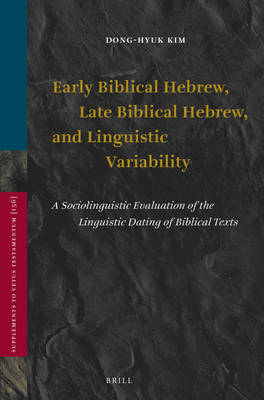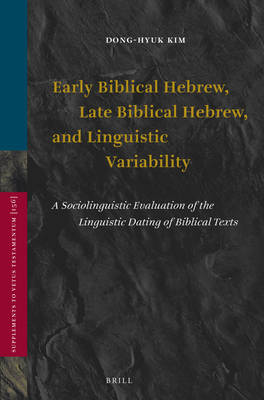
- Afhalen na 1 uur in een winkel met voorraad
- Gratis thuislevering in België vanaf € 30
- Ruim aanbod met 7 miljoen producten
- Afhalen na 1 uur in een winkel met voorraad
- Gratis thuislevering in België vanaf € 30
- Ruim aanbod met 7 miljoen producten
Zoeken
Early Biblical Hebrew, Late Biblical Hebrew, and Linguistic Variability
A Sociolinguistic Evaluation of the Linguistic Dating of Biblical Texts
Dong-Hyuk Kim
€ 218,45
+ 436 punten
Omschrijving
In Early Biblical Hebrew, Late Biblical Hebrew, and Linguistic Variability, Dong-Hyuk Kim attempts to adjudicate between the two seemingly irreconcilable views over the linguistic dating of biblical texts. Whereas the traditional opinion, represented by Avi Hurvitz, believes that Late Biblical Hebrew was distinct from Early Biblical Hebrew and thus one can date biblical texts on linguistic grounds, the more recent view argues that Early and Late Biblical Hebrew were merely stylistic choices through the entire biblical period. Using the variationist approach of (historical) sociolinguistics and on the basis of the sociolinguistic concepts of linguistic variation and different types of language change, Kim convincingly argues that there is a third way of looking at the issue.
Specificaties
Betrokkenen
- Auteur(s):
- Uitgeverij:
Inhoud
- Aantal bladzijden:
- 204
- Taal:
- Engels
- Reeks:
- Reeksnummer:
- nr. 156
Eigenschappen
- Productcode (EAN):
- 9789004235601
- Verschijningsdatum:
- 31/10/2012
- Uitvoering:
- Hardcover
- Formaat:
- Genaaid
- Afmetingen:
- 161 mm x 243 mm
- Gewicht:
- 480 g

Alleen bij Standaard Boekhandel
+ 436 punten op je klantenkaart van Standaard Boekhandel
Beoordelingen
We publiceren alleen reviews die voldoen aan de voorwaarden voor reviews. Bekijk onze voorwaarden voor reviews.








